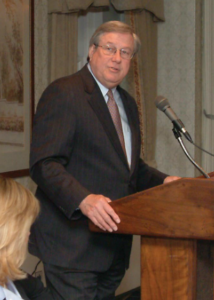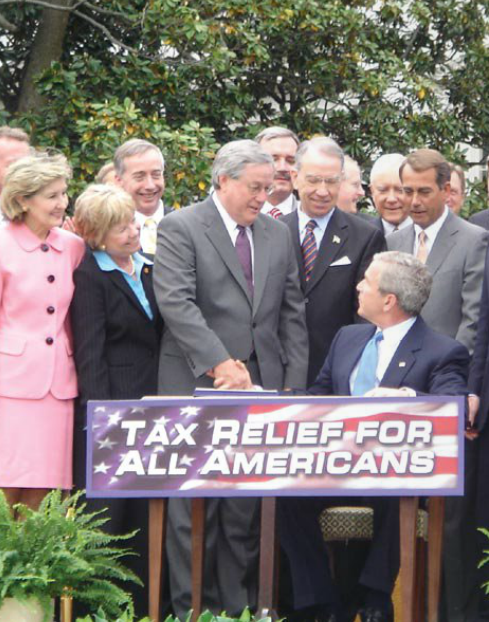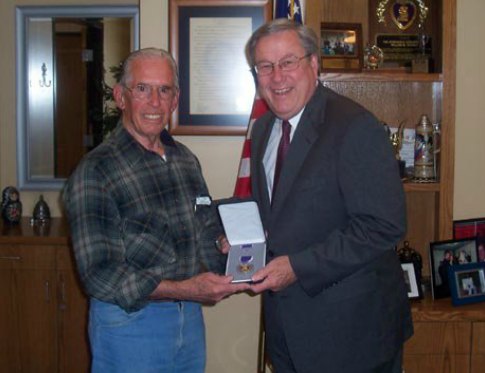
Earlier this year, Congressman Bill Thomas announced his retirement after nearly 30 years in the U.S. House of Representatives. First elected in 1978, Thomas has served as Chairman of the Ways and Means Committee since 2001. He recently sat down with the Ripon Forum to discuss his experiences in politics and share his thoughts on what the future holds on Capitol Hill – not just in this year’s mid-term elections, but in the years ahead, as well.
∗∗∗∗∗∗∗∗∗∗∗∗∗∗∗∗∗∗∗∗
RF: What drove you to get into politics in the first place?
THOMAS: I’ve always been interested in politics. I remember listening to broadcasts when I was younger and watching the 1952 national conventions on television. In high school, I was involved in student government. When I was a teacher, I advised my students to get involved in government themselves.
Following the elections of 1972, some of my former students came to me and asked, “How do we make sure that we are not taken over by outside groups?” At the time, local groups were taken over by national ones. For example, the Committee to Reelect the President came in, literally took over the operation, sucked out all the money, and wouldn’t share any of it with the locals.
I was the only non-incumbent Republican to win anything in California in 1974. I served two terms in the Assembly and had no interest in running for Congress… I got selected to go on the ballot in November without going through a primary. And I won.
So in talking to some of them, I said we should build a structure of our own and run it ourselves. I had been involved in campaigns in Kern County since 1965. And I had been involved in state races advising candidates on issues, aspects, that sort of thing; how do you rank precincts, all the stuff that’s not really common.
Of course, we didn’t have computers back then; we didn’t color code maps. So I brought a lot of techniques to the area that had been never done before.
In January of 1973, we decided that I would go ahead and run for the GOP central committee. I was teaching college at the time and didn’t want people to know my partisan affiliation. But it was a pretty serious situation, so I got elected to fill a vacancy on the central committee. And I wound up party chairman. As part of this job, I was supposed to recruit somebody to run for office. I wound up going on the ballot myself and running for the State Assembly against an incumbent Democrat. I made his positions and voting record issues in the campaign. We also had the ability to organize. Plus, it was the last year of Ronald Reagan’s governorship, and he came down for my first campaign event – $25 a head. We got a lot of publicity out of that. The entire campaign cost $39,000. I didn’t spend a dime I didn’t already have. I was my own campaign manager. I wasn’t going to let anybody come in front. It was a well run and well-managed campaign against an incumbent who was more vulnerable than he thought he was.
I was the only non-incumbent Republican to win anything in California in 1974. I served two terms in the Assembly and had no interest in running for Congress. But then the incumbent Congressman died after the primary in July of 1978. We had a convention, and I got selected to go on the ballot in November without going through a primary.
And I won.
We’ve seen some controversy about retirements in this institution. you don’t negotiate your next job while you’re still in this one. You do the work even though you’re a short timer …And then you talk about doing other stuff so that people can begin to see how it is that we probably should conduct ourselves as Members of an institution such as this.
RF: Why are you retiring now?
THOMAS: Republicans, before they were a majority, decided to put term limits on Committee Chairmen. I have some beliefs about that. I thought it was absolutely essential when we came in. I think we now have to begin to look at losing institutional knowledge if you lock it in as an absolute rule. So, this is the end of my three terms as Chairman of the Ways and Means Committee. But also, you have to back up.
I came here in 1978. I had 16 years in the minority. I’m almost now equaling that in the majority. I went through three terms as Chairman of the House Administration Committee. We fundamentally reorganized the institution. My colleagues let me Chair the House of Representatives when the first Republican majority came in. Then I became Chairman of the Ways and Means Committee. While I was Chairman of House Administration, I was Chairman of the Health Subcommittee of Ways and Means. So I was Chairman of a full committee and Chairman of a subcommittee when we were battling Hillary Clinton and “Clinton Care” and all of that.
In 2001, I became Chairman of the Ways and Means Committee. When we became a majority, there was a majority Republican Senate at the same time. But obviously, coincidentally, at the same time I became Chairman, we had a Republican President elected. I never thought we were going to be in the majority in the House in my lifetime, let alone the House and Senate and Presidency, as well. So we had an opportunity to make law, without excuses, that would be signed. Before, we were trying to make laws with a Democratic President. We were able to get him to sign certain things, but it was very difficult. So I’ve had an opportunity for six years, and I guess the only perfect ending would be that I’m also Chairman in the last two years of Bush’s Presidency. So this is about as close as it comes in reality.
Sandy Koufax was one of my favorite pitchers. He quit when he could still pitch and win games. He didn’t quit because he couldn’t pitch. And I think he has always been looked up to as the way you gotta go out. We’ve seen some controversy about retirements in this institution. You don’t negotiate your next job while you’re still in this one. You do the work even though you’re a short timer. You show up, you do the things you need to do, and then it ends. And then you talk about doing other stuff so that people can begin to see how it is that we probably should conduct ourselves as Members of an institution such as this.

RF: Looking back on it, what do you consider the greatest accomplishments of your career?
THOMAS: One of the things that very few people focus on, but something which I was very proud of at the time, had to do with the economy and the need to stimulate the economy. Ever since [John Kenneth] Galbraith wrote about the macro economy versus the micro economy and the emergence of the Federal Reserve Board, the way you dealt with trying to counter economic cycles was through monetary policy. We’re seeing that now, when they tighten things up to restrict the money supply and when they lower the discount rate to expand the money supply.

No one ever looked at fiscal policy as something that can be used. And although it is ancient history to a lot of people, when we came in in 2001, we had begun a significant down cycle while Clinton was still president. The Federal Reserve had been lowering the rate. And they had been lowering it as they had been raising it — in a very predetermined fashion. As a result, what the Federal Reserve was going to do had often already been discounted in the market place because they knew what the Fed was going to do. Consequently, it didn’t have the kind of impact that we needed. But when we came in, and by May of 2001, we had sent to the President’s desk a significant individual tax reduction package which produced rebate checks in the hands of consumers by August, in time for back to school. Although the package was ultimately worth trillions of dollars, it had an impact far beyond the actual amount of money involved because we used fiscal policy as a tactical measure rather than a strategic measure. No one had really written or thought about it because Congress was always reactive rather than active. It took too long. If they tried to do it, they always missed the target. Too high, too late, not enough — it just wasn’t a tool that you could fine tune.
If you were to talk to Greenspan – one of the fun conversations we’ve had over the years is how he never thought the Congress could perform that kind of a function. And frankly, he’d be loathe to talk about it because the people who are going to try it will get it wrong. But I planned it, we worked on it, and we got it to happen. And I thought it was important to get money into consumers’ hands to continue to make a better economy. Now, following that, we had to do something about business, investment and savings, and we did with subsequent legislation. But the idea that you can – in a coordinated way, when the government is in the hands of one party — be responsible about using fiscal policy to stabilize, maintain and develop growth in the economy, was something that nobody talked about which we actually accomplished. That was very, very hard to do. Being able to utilize fiscal policy as an instrument of moderating economic stimulants was pretty tough.
The idea that you can – in a coordinated way, when the government is in the hands of one party — be responsible about using fiscal policy to stabilize, maintain and develop growth in the economy, was something that nobody talked about which we actually accomplished.
RF: Looking beyond the horizon, what two or three issues do you see out there that need to be addressed but, for whatever reason, have not yet been addressed?
THOMAS: The current one that we may or may not address is immigration, which is something that has been out there but hasn’t come to a head. We don’t like to see it come to a head in partisan argument of security and a terrorism scenario, but in part that’s what happened. We’ve had fits and starts in trying to deal with it. And when you don’t deal with it, the next time you visit it, the accumulated concerns become kind of a test. But you don’t see reasonable discussions that often in that regard. So that is one concern of mine.
Obviously, from a jurisdictional examination, we have not dealt with safety net issues — Social Security, especially. We’ve begun to address Medicare. It is pleasing to see that the competitive model we’ve put into Medicare prescription drugs continues to lower costs despite the predictions of those who don’t truly believe the marketplace can have a positive effect on prices. And so we have to address that.
And, you know, the tax structure. The rest of the world got destroyed in either World War I or World War II. They rebuilt their economic machines, and we helped them with the Marshall Plan and other forms of assistance. They also rebuilt their governments and tax structures because they were in shambles. Ours wasn’t. So, although we no longer have the Bessemer burners and all of the old stuff that we had in the industrial marketplace, we still have the old, creaky 19th century tax structure based on income that most other countries don’t have, and we do have to modernize that to be more effective. In the area, we still lead the world, we are the world’s largest importer and world’s largest exporter, but we have a very antiquated tax structure which will not serve us well. It does it now, but will get worse if we don’t make some critical changes.
RF: If you believe the polls, Republicans face a real challenge in the mid-term elections this fall. What do you think the party needs to do to hold and build upon its majority in the House and Senate?
THOMAS: I don’t pay a lot of attention to polls because polls are a snapshot at any given time. The elections are not soccer games. You don’t win them 1-0. They’re more like basketball games. You win them 87-85 – sometimes in overtime. So, it’s what you do over time in an accumulated way. However, like a basketball game, the team you start with is the team you end with. Using another analogy, this isn’t draw poker. The Democrats don’t get to go back and pick their primary candidates on what they know now versus what they knew in November or December. And so, if you look at the match ups between us and them, and the understanding that you have to win a majority of seats to be a majority, it’s very difficult for me to see how they could achieve that. That’s number one.
I firmly believe incumbents are not beaten. Incumbents beat themselves. You do stupid things; stupid things happen. If the majority to pass legislation, which voters think they are responsible for, then the majority may get voted out.
Number two: I firmly believe incumbents are not beaten. Incumbents beat themselves. You do stupid things; stupid things happen. If the majority does not use its majority to pass legislation, which voters think they are responsible for, then the majority may get voted out. But that’s the majority doing it to itself because it didn’t do what it was supposed to do. I don’t see any of those fundamental flaws in the game plan. I see journalists and others trying to paint a picture that looks like that. And obviously, we aren’t coming in as odds on favorites, but on the margin, I don’t see the profile that would lead to changing of the majority in either the House or Senate.
RF: What’s been the biggest change in Washington since you were first elected?
THOMAS: Going from the minority to the majority. That makes all the difference in the world. When I came here, there had been no Republican majorities for 40 years. Not one of the Members of the House had ever served in the majority. There was only one Democrat who had served in the minority – Abner Mikva. So I went to talk to him about how it was being in the minority, and he said, “Bill, I honestly don’t remember.” And so you had a culture of minority-think with Republicans. If you were any good, you didn’t stay in the House. You ran for Senate, you ran for Governor. You went back to whatever you were doing. Over the years, you had an accumulation of folks who either thought this was really good or were comfortable in being the minority. That’s part of the reason we had to have term limits on the chairs. It isn’t as critical any more. We need to be able to assess that.
So we came into the majority without having any knowledge, history, or understanding of how to be the majority. Similarly, Democrats went into the minority not having any idea of how to be the minority. I think a lot of folks on our side thought we’d be in there for one term; looking over their shoulder, you know: “Am I supposed to sit in the chairman’s chair? Yeah, yeah you can sit in the Chairman’s chair.” The first time we convened the Ways and Means Committee, Sam Gibbons sat in the chair, and I had to go explain to him that you are no longer in this chair. But now that we’ve been in for more than a decade, you have to realize that one of the reasons Democrats were in the majority for more than 40 years is just what I said earlier — incumbents only beat themselves. You have resources. You have staff. You have an agenda. You have the gavel. And if you lose, it’s your fault.
Republicans haven’t lost for more than a decade because we haven’t done anything fatally wrong. The newspapers are anxious to paint every step as being a fatally wrong step. I saw a headline in today’s Washington Post trying to generate a bandwagon effect. I don’t see that. The job is to counsel periodically the majority and leadership to realize that majorities are not sustainable if you do nothing. We lost the Senate majority because the Senate Republicans after that first two years did nothing. I mean, how do you run a campaign when you go out and you say, “We’re the majority and we did nothing. Send us back and we’ll do nothing for another two years.” They lost, they then began to do something, and lo and behold, they’ve been in and they’ve stayed in.

I got involved in the leadership race because I thought it was necessary to put some fresh thinking in there and to get someone who had actually been a Chairman of a Committee; someone who understands that when you’re one week on and one week off, two weeks on and two weeks off, you can’t function in producing the product that the majority has the ability to produce – a product which helps sustain the majority. There had been an unhealthy separation between leadership and the committee chairs, so that was one modest way to pull it together. So, being the majority, knowing how to sustain the majority, and putting out the product that got you in the majority in the first place is a major difference between now and when we first got here.
RF: In a tribute you paid to Ronald Reagan after he passed away two years ago, you stated that he should be remembered not only for being a great communicator, but for being a great compromiser, as well. Do you think compromise in Washington is harder today than it used to be? If so, why is it harder, and what can or should be done to change it?
THOMAS: President Reagan had a way of conveying that he was not a compromiser, but he did an awful lot of it. And that’s how you make things work. Accommodation and compromise are part of the American political tradition. You can’t win without a majority. We don’t have proportional representation in the legislature; you get 20% of the votes, you get 20% of the seats like a lot of other countries. The winnertake-all-requirement forces you to make concessions to be able to control.
So you get broad coalitions, but you strive to have the coalitions in your party to achieve a majority, not after you get elected because it is a win or lose system. Other people think that’s horrendous. I think it’s significant because it forces you to a common position in which whatever party wins, it isn’t a significant and dramatic shift in policy. Tweedle Dum and Tweedle Dee isn’t too bad if you’ve got the basic structure pretty right in terms of a democracy, frequent elections and that sort of thing. You’ve got liberals and moderates and conservatives in both parties. They may be salted slightly differently, but they still have similar structures. We like to stress differences. If you stress similarities, it would be amazing how much we are alike versus European systems.
President Reagan had a way of conveying that he was not a compromiser, but he did an awful lot of it. And that’s how you make things work. Accommodation and compromise are part of the American political tradition.
And of course, the result is, someone wins and someone loses, but they show up in January and shake hands and transform the government. We don’t shoot our way out of one majority into another. We don’t imprison the losers and that sort of thing. So that’s pretty positive about our system. And if you need a majority, you have to have accommodation and compromise. The other thing is, if you are opposed to someone today, don’t get too carried away on the opposition because you may need them tomorrow. And those I think are positive in making the fundamental system work.
RF: Finally, what advice would you have for a young person thinking about getting into politics today?
THOMAS: There are a lot of ways to get into politics. A lot of people have a negative attitude about it. But of course, the argument is, if in fact it isn’t as good as it could be, then that’s an opportunity for you to get in and make it better. So rather than shy away from involvement, if you do think you could make a difference, that’s a responsibility to get involved.
So what I’ve tried to do over the years is give young people as much of an opportunity as possible to get involved to see if they like it. If they don’t like it, fine, then they walk away with knowledge. But a lot of people decide that “it is something I can do.” They find it interesting, intriguing, enjoyable, and worthwhile. Then you have a few people who had an opportunity to taste politics.
To me, the prime value of my time has been, when I started out teaching, getting people to get involved in politics to get extra credit. We’ve been able to bring in young people, to give them an opportunity, and then they can take on politics as a career.





